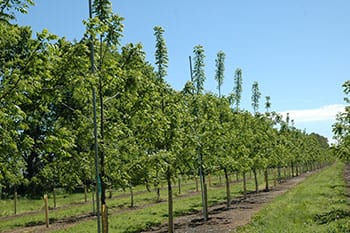 The application of intensive cultivation techniques to our fine hardwood plantings, combined with the selection of good farming soils for the location of the tree farms, ensures that the genetic superiority of our improved cultivars will be expressed to its maximum potential.
The application of intensive cultivation techniques to our fine hardwood plantings, combined with the selection of good farming soils for the location of the tree farms, ensures that the genetic superiority of our improved cultivars will be expressed to its maximum potential.
Our intensive cultivation techniques include:
- weed control
- fertigation
- summer and winter pruning
- phytosanitary treatments
Our ongoing research program is continuously testing the application of these techniques in order to optimize their utilization, assess their effectiveness and measure its economic return.
ArborAmerica’s fine hardwood trees are the result of a long term breeding program. Our cultivars have been tested to be genetically superior in terms of fast growth rate and straightness. Our Research Director and breeder is Dr. Walter Beineke, who started his groundbreaking work on black walnut genetic improvement more than 40 years ago, and who is still leading our efforts in the genetic improvement of black walnut, black cherry, and white oak.
Our best selections have been patented in the United Stated, based on their DNA fingerprinting. This allows us to protect our intellectual property, and the rights of our investors in a powerful and reliable way.
Clonal propagation assures that the trees that are planted in the field will show these enhanced characteristics.
We also produce hundreds of thousands of nuts each year from our patented varieties, which gives our the unique opportunity of producing seedling for big scale plantations of last generation black walnut.
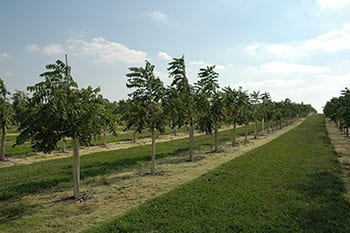
The combination of preemergent and postemergent herbicides allows us to keep a weed free environment for the planted trees. This is particularly important during the first years of development of the trees. Weeds compete with the trees for nutrients and water, and they also host pests and diseases that can be easily transmitted to the trees if there is direct leaf contact.
Arbor America complies with all applicable regulations when using herbicides, and we select the active ingredients based on their efficacy and their possible effects on the environment.
Mowing completes our weed control program, keeping the grass strip that grows between our tree rows under control. This grass strip is an important tool for erosion control.
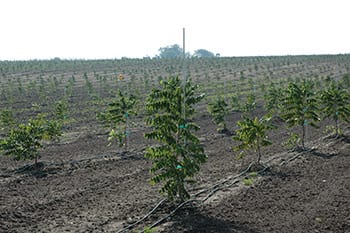
We furnish our plantings with a drip irrigation system that ensures a constant source of water for the trees during the growing season. This allows us to complement rainfall and also to deliver nutrients and phytosanitary treatments to the trees.
 The application of intensive cultivation techniques to our fine hardwood plantings, combined with the selection of good farming soils for the location of the tree farms, ensures that the genetic superiority of our improved cultivars will be expressed to its maximum potential.
The application of intensive cultivation techniques to our fine hardwood plantings, combined with the selection of good farming soils for the location of the tree farms, ensures that the genetic superiority of our improved cultivars will be expressed to its maximum potential.
Our intensive cultivation techniques include:
- weed control
- fertigation
- summer and winter pruning
- phytosanitary treatments
Our ongoing research program is continuously testing the application of these techniques in order to optimize their utilization, assess their effectiveness and measure its economic return.
ArborAmerica’s fine hardwood trees are the result of a long term breeding program. Our cultivars have been tested to be genetically superior in terms of fast growth rate and straightness. Our Research Director and breeder is Dr. Walter Beineke, who started his groundbreaking work on black walnut genetic improvement more than 40 years ago, and who is still leading our efforts in the genetic improvement of black walnut, black cherry, and white oak.
Our best selections have been patented in the United Stated, based on their DNA fingerprinting. This allows us to protect our intellectual property, and the rights of our investors in a powerful and reliable way.
Clonal propagation assures that the trees that are planted in the field will show these enhanced characteristics.
We also produce hundreds of thousands of nuts each year from our patented varieties, which gives our the unique opportunity of producing seedling for big scale plantations of last generation black walnut.

The combination of preemergent and postemergent herbicides allows us to keep a weed free environment for the planted trees. This is particularly important during the first years of development of the trees. Weeds compete with the trees for nutrients and water, and they also host pests and diseases that can be easily transmitted to the trees if there is direct leaf contact.
Arbor America complies with all applicable regulations when using herbicides, and we select the active ingredients based on their efficacy and their possible effects on the environment.
Mowing completes our weed control program, keeping the grass strip that grows between our tree rows under control. This grass strip is an important tool for erosion control.

We furnish our plantings with a drip irrigation system that ensures a constant source of water for the trees during the growing season. This allows us to complement rainfall and also to deliver nutrients and phytosanitary treatments to the trees.
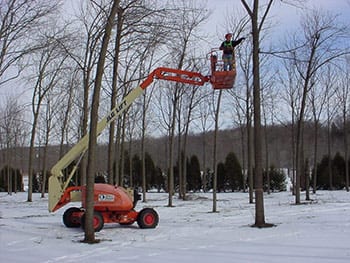 Pruning is a vital tool in order to achieve our goal of obtaining quality lumber from our trees. Winter pruning is done while the trees are dormant and it removes all branches that would cause a defect in the lumber. Summer pruning removes weight from the leafed trees so as to prevent wind damage during the growing season, and it also ensures that all trees have a “leader” branch with apical dominance.
Pruning is a vital tool in order to achieve our goal of obtaining quality lumber from our trees. Winter pruning is done while the trees are dormant and it removes all branches that would cause a defect in the lumber. Summer pruning removes weight from the leafed trees so as to prevent wind damage during the growing season, and it also ensures that all trees have a “leader” branch with apical dominance.
Pests and diseases are threats to the investment in trees. They can be controlled through the expert application of phytosanitary products. We monitor our plantings continuously during the growing season and apply preventive treatments for diseases and corrective treatments for pests.
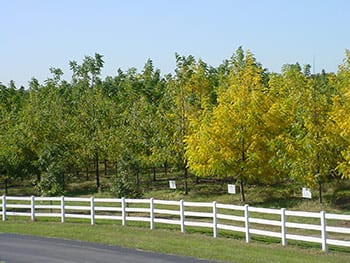 All of our cultivation techniques are being tested in order to improve efficiencies and determine rates of return on the investment. We have over 5,000 trees and 50 acres devoted to field tests on fertigation protocols, weed control techniques, phytosanitary treatments and flower suppression. All of our intensive cultivation techniques are constantly tested against control block in order to improve the different techniques, analyze the return on the investment on the different aspects of intensive cultivation and determine efficiencies of the different possible protocols.
All of our cultivation techniques are being tested in order to improve efficiencies and determine rates of return on the investment. We have over 5,000 trees and 50 acres devoted to field tests on fertigation protocols, weed control techniques, phytosanitary treatments and flower suppression. All of our intensive cultivation techniques are constantly tested against control block in order to improve the different techniques, analyze the return on the investment on the different aspects of intensive cultivation and determine efficiencies of the different possible protocols.
 Pruning is a vital tool in order to achieve our goal of obtaining quality lumber from our trees. Winter pruning is done while the trees are dormant and it removes all branches that would cause a defect in the lumber. Summer pruning removes weight from the leafed trees so as to prevent wind damage during the growing season, and it also ensures that all trees have a “leader” branch with apical dominance.
Pruning is a vital tool in order to achieve our goal of obtaining quality lumber from our trees. Winter pruning is done while the trees are dormant and it removes all branches that would cause a defect in the lumber. Summer pruning removes weight from the leafed trees so as to prevent wind damage during the growing season, and it also ensures that all trees have a “leader” branch with apical dominance.
Pests and diseases are threats to the investment in trees. They can be controlled through the expert application of phytosanitary products. We monitor our plantings continuously during the growing season and apply preventive treatments for diseases and corrective treatments for pests.
 All of our cultivation techniques are being tested in order to improve efficiencies and determine rates of return on the investment. We have over 5,000 trees and 50 acres devoted to field tests on fertigation protocols, weed control techniques, phytosanitary treatments and flower suppression. All of our intensive cultivation techniques are constantly tested against control block in order to improve the different techniques, analyze the return on the investment on the different aspects of intensive cultivation and determine efficiencies of the different possible protocols.
All of our cultivation techniques are being tested in order to improve efficiencies and determine rates of return on the investment. We have over 5,000 trees and 50 acres devoted to field tests on fertigation protocols, weed control techniques, phytosanitary treatments and flower suppression. All of our intensive cultivation techniques are constantly tested against control block in order to improve the different techniques, analyze the return on the investment on the different aspects of intensive cultivation and determine efficiencies of the different possible protocols.



